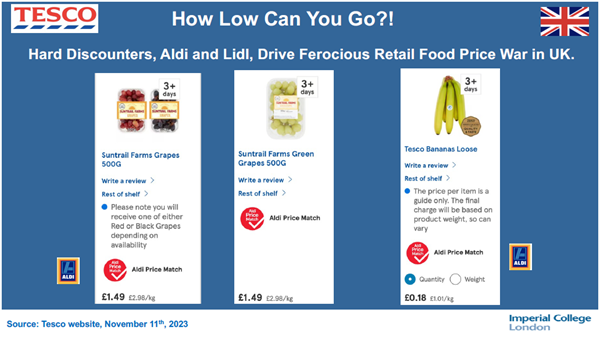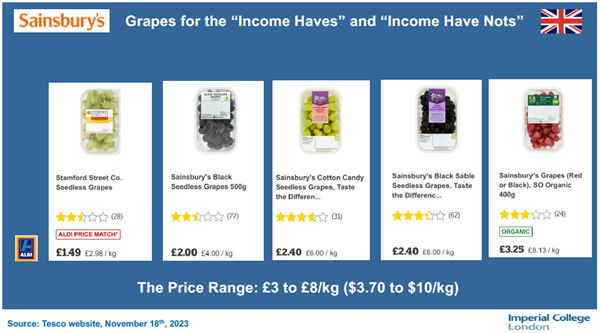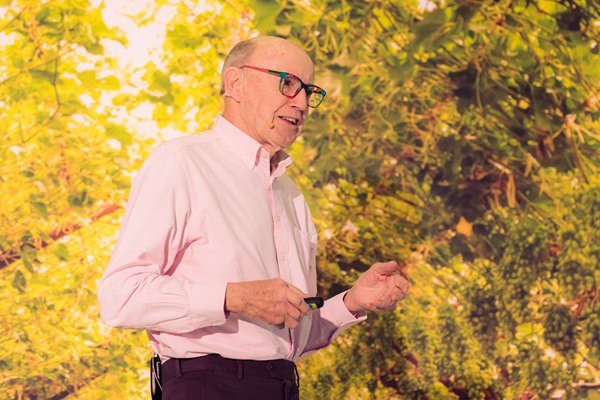 Prof David Hughes, emeritus professor in food marketing at Imperial College, London, is worried that table grapes are entering the dreaded terrain of commodities.
Prof David Hughes, emeritus professor in food marketing at Imperial College, London, is worried that table grapes are entering the dreaded terrain of commodities.
He presented his take on table grapes and the world of today at the Tenth International Table Grape Symposium yesterday.
Right: Mecia Petersen, South African Table Grape Industry, market development & communications manager with Prof David Hughes
Grocery wars: race to the bottom
Prof Hughes discussed the impact of hard discounters have had on a declining fresh produce consumption. He remarked that UK consumers spent the equivalent of two take-away coffees (£4.30) per week on fresh produce.
"We’ve failed to communicate the message of fruit being healthy and great value for money," he put to attendees, noting that three-fifths of UK fruit and vegetables are sold at breakeven prices or less.
British apple consumption has fallen sharply; the fruit that used to be considered "a great purchase', he said, is now unfashionable (with two exceptions mentioned below).
Berries have stolen the show
He posited that in the UK today, bananas have essentially become "a free good".
"It’s a pound right across the high street - and remember that it’s the most consumed fruit in the world. Bananas have fallen into the dreaded commodity trap - and grapes are straying into that area."
Hard discounters have been forcing prices down he argued, in the UK and in the EU where these retail groups were outpacing the others.
 Source: Prof David Hughes' presentation at 10ITGS
Source: Prof David Hughes' presentation at 10ITGS
The big competition for grapes is berries, despite being more expensive per unit weight.
Berries have stolen the show and now account for 30% of total fresh fruit spend in the UK, while there has been virtually no growth in the retail prices of grapes over the past decade - and in the United States, a very similar patterns has been playing out, he added.
Grapes for the haves and the have-nots
"Income gaps have widened worldwide. "The lowest 20% of households spend 37% of their Income on food whereas the top 20% spend 7% of their Income on food."

Source: Prof David Hughes' presentation at 10ITGS
Who’s succeeding?
Prof Hughes set out why he considers fruit brands like Pink Lady and Rockit apples and Halos easy peelers as some of the winners in the current system. These are brands that are demonstrably different from their competitors, with a clear message that resonates with consumers.
A few months ago Sun World announced their new grape brands of green and red grapes.
"Sun World is very good at what they do. We’ll have to wait and see whether consumers think these brands are identifiably different and willing to pay a premium."
"Mind your Ps and Qs when dealing with China"
For the South African table grape industry (and others), committed to growing its share in China, he had a word of caution.
"Be careful what you say and when you say it. China can make you and it can break you," he noted, pointing to the 300% tariff placed on Australian wines. "Mind your Ps and Qs when dealing with China."
There are today many routes to consumers through online sales (he held up Chinese online retailer Pinduoduo as a particularly innovative player).
He remarked that in the Hughes household, weekly shopping on a laptop now starts with the question: "What did we buy last week" instead of being open to persuasion by the theatrics of an old-school, carefully-staged display at a fruit stall.
 Prof David Hughes, delivering his frank views on grapes et al (photos: Bradley Urion)
Prof David Hughes, delivering his frank views on grapes et al (photos: Bradley Urion)
"In ten years, you'll all be as round as puddings!"
Many South Africans are obese, he showed through figures tracking the phenomenon over years across sexes and ages in the country.
Not much below half of South African women can be considered obese. Among men it's also been increasing with an expected third of males obese by 2035.
But it's among children that obesity is uncontrollably growing, according to the World Obesity Atlas, and Prof Hughes amiably informed the audience: "In ten years, you'll all be as round as puddings!"
Prof Hughes discussed grapes' snack value in comparison to a rather narrow set of examples including macaroons (as a snack!), chocolate bars and crisps, and excluding common snacks such vegetable crudités, nuts and peanuts.
"That list of ingredients is longer than most books I've read" is his opinion on the ingredients of a Twinkie.
In this company, grapes look good.
"Grapes need a health platform. Tell people why they should eat them apart from as a tasty snack!"
Sugar is an issue
But there's a matter that could become increasingly problematic: the high sugar content of new grape cultivars.
"What’s the convincing explanation on sugar content of grapes. It’ll be under the microscope by health activists and on the retail label as a nutriscore."
Consumers are, in fact, turning away from ultra-processed foods and increasingly consulting a product's environmental rating, where available.
The European Union is driving much of the environmental costing brought to the business model, a market of singular importance to table grape producers.
He himself considers non-recyclable packaging as simply unacceptable. A product's ecological footprint will only become more important and quantified in future, and environmental ratings will become a bigger part of a shopper's decision-making.
Prof David Hughes' presentation can be viewed here
